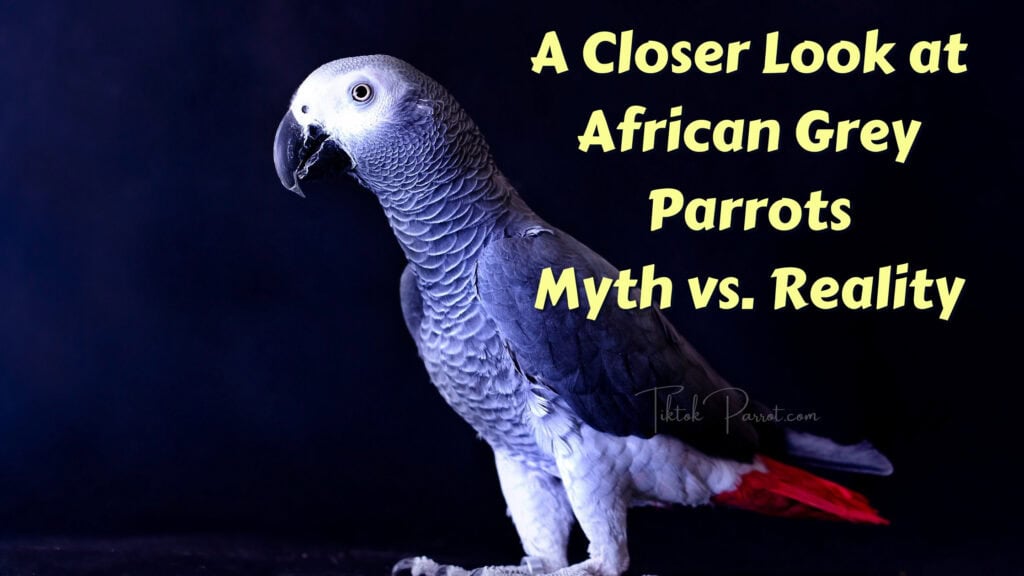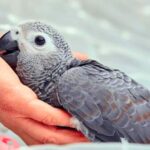African grey parrots are highly intelligent and social birds that have long been popular as pets. With their distinctive grey feathers and ability to mimic human speech, it’s no wonder that these birds have captured the hearts of many.
“Uncover the truth about African grey parrots in our latest blog post, ‘A Closer Look at African Grey Parrots: Myth vs. Reality.’ From their care needs and training abilities to their socialization requirements and lifespan, get the facts about these intelligent and social birds. Don’t let myths and misconceptions about African grey parrots lead to misunderstandings – read on for the truth about these amazing birds.”
By understanding the myths and realities of African grey parrots, we can better care for these amazing birds and provide them with the best possible quality of life. If you’re considering adding an African grey parrot to your family, be prepared for the long-term commitment and research the care requirements to ensure you can provide a happy and healthy home for your new feathered friend.
However, there are also many myths and misconceptions about African grey parrots that can lead to misunderstandings and even mistreatment of these birds. In this article, we’ll take a closer look at some of the most common myths about African grey parrots and separate fact from fiction.
Myth #1: African grey parrots are easy to care for.
Reality: While African grey parrots are not the most high-maintenance pets, they do require a significant amount of care and attention to thrive. They need a varied diet that includes a variety of fruits, vegetables, and a high-quality pellet or seed mix. They also need plenty of mental and physical stimulation to prevent boredom, which can lead to negative behaviors.
Myth #2: African grey parrots only mimic words.
Reality: African grey parrots are known for their ability to mimic human speech, but they are also highly intelligent and capable of learning a wide range of behaviors and tricks. They can learn to play games, solve puzzles, and even understand basic concepts like colors and shapes.
Myth #3: African grey parrots only live for a few years.
Reality: With proper care, African grey parrots can live for decades. Some individuals have lived for over 50 years in captivity. However, it’s important to note that these birds have a long lifespan and require a significant commitment from their owners.
Myth #4: African grey parrots are aggressive.
Reality: African grey parrots, like any other animal, can exhibit aggressive behavior if they feel threatened or uncomfortable. However, with proper training and socialization, African grey parrots can learn to be gentle and affectionate pets.
Myth #5: African grey parrots don’t need socialization.
Reality: African grey parrots are highly social birds that need regular interaction and socialization to thrive. They are known to bond closely with their owners and can become distressed if left alone for long periods. It’s important to provide your African grey parrot with plenty of opportunities for social interaction, whether that be through playtime, training sessions, or simply spending time together.
Myth #6: African grey parrots are all the same.
Reality: Just like humans, African grey parrots are individuals with their personalities and characteristics. While they may share some common traits, each African grey parrot is unique and may exhibit different behaviors and preferences. My Mitthu (TiktokParrot) was unique and the most talkative parrot in the world, but sad he did not live long enough to get noticed.
Myth #7: African grey parrots don’t need to see a vet.
Reality: African grey parrots, like any other pet, need regular check-ups and medical care to stay healthy. It’s important to find a veterinarian who is experienced in treating exotic birds, as they may have different healthcare needs than other pets. Regular visits to the vet can help to detect and address any health issues early on, improving the chances of successful treatment.
Myth #8: African grey parrots are hard to train.
Reality: African grey parrots are highly intelligent and can be trained to perform a wide range of behaviors and tricks. However, it’s important to approach training with patience and positive reinforcement, as these birds can be sensitive and may not respond well to negative or punishment-based training methods. It’s also important to keep in mind that African grey parrots may need more time and repetition to learn new behaviors, so it’s important to be consistent and patient.
Myth #9: African grey parrots don’t need toys or enrichment.
Reality: African grey parrots are intelligent and active birds that need plenty of mental and physical stimulation to prevent boredom and negative behaviors. Providing your African grey parrot with a variety of toys and enrichment activities can help to keep them entertained and engaged. This may include puzzle toys, foraging toys, and other interactive items that encourage problem-solving and exploration.
Myth #10: African grey parrots don’t need to fly.
Reality: African grey parrots are naturally adapted to fly in the wild, and it’s important to allow them to fly regularly to maintain their physical and mental health. If you have an African grey parrot as a pet, it’s important to provide them with a safe and spacious area to fly and exercise. This may include a designated flight area in your home or a supervised outdoor flight area.
Conclusion:-
By separating myth from reality, we can better understand the needs and behaviors of African grey parrots and provide them with the best possible care. These highly intelligent and social birds make wonderful pets for those who are prepared for the long-term commitment and are willing to provide a stimulating and enriching environment.
By understanding the realities of African grey parrots, we can help to provide these intelligent and social birds with the care and attention they need to thrive. If you’re considering adding an African grey parrot to your family, it’s important to do your research and be prepared for the long-term commitment required to care for one of these amazing birds.
If you found this blog helpful, It would be great if you could share it with your family and friends who might find it useful as well.
For more useful content about African Grey parrots, you can subscribe my site with your email to get notification upon publishing a new blog, the subscribe box you can see on the right side of this page. Also if you get an alert on your web browser while browsing my site, allow it and that will also give you an alert whenever I publish a new blog. 🙂
Stay safe and much love !














